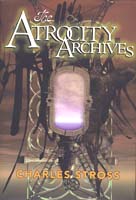 The
Atrocity Archives
The
Atrocity Archives
by Charles Stross
A book review by Mark L. Olson
Golden Gryphon, 2004, $24.95, 273 pp
The Atrocity Archive was serialized in Spectrum SF a small UK publication. It's sorta like cyberpunk and sorta like Tim Powers' Declare and sorta like nothing else. Essentially, the premise is that H. P. Lovecraft actually wrote near-future techno-SF thrillers disguised as fantasy/horror. All of Lovecraft's stories reflect plausible extrapolations of the near future of our world.
Briefly, the Platonic Realm of mathematics is real – most mathematicians believe that anyway – and is influenced by and can influence our real world. The right theorem, the right geometric construction, can cause detectable effects in physical reality, and one of the easiest effects to create is to open a gate to a parallel universe. Unfortunately, the easiest attainable effect is to create a bridge between vastly different physical realities (the universe consists of an Everett-Wheeler ensemble of histories) and the earlier the branch point, the easier it is to create a bridge. And the earlier the branch point, the more alien the world reached. Many of these distant universes are dead, but many aren't. And some hold ancient intelligences, horribly intelligent beings still barely alive as their universe gutters towards heat-death. Horribly intelligent beings eager for a younger universe to exploit. Other universes have time running much faster and contain fast-thinking, but stupid, entities which are more like self-aware computer viruses than anything -- and which can infect human nervous systems and which can take over the mind, the soul, of anyone so foolish as to come knocking.
The key to understanding these effects is the Turing-Lovecraft Theorem. That theorem was first discovered in the 30s and The Laundry, a very secret branch of the British Secret Service that Bob Howard works for is devoted to suppressing its rediscovery, since the Turing-Lovecraft Theorem, properly applied, makes A-bombs look harmless. The Laundry's job is to prevent people from discovering these theorems, and to clean up afterwards when they do.
The main character of The Atrocity Archive is a young computer geek (Stross frequently uses computer geeks as his main characters and shows a wonderful sympathy for their culture and a terrific knack for using their jargon effectively in his stories) who discovers a remarkable theorem and is contacted shortly thereafter by a shadowy British governmental organization which offers him the choice of joining up and helping to police people like himself or getting out of work remotely related to computing or mathematics or dying.
This novel traces Bob's move from computer jock to field agent. The case starts as just another possible T-L rediscovery, but quick turns into something involving the Iraqi secret police and more. And the deeper Bob look, the more it looks like the forces behind them are Nazi. The story starts out fairly light-heartedly, (a nice touch is when a newly-recruited geek is visiting the main character's apartment and sees a copy of Vol 4 of Knuth. She's amazed until he explains that the Black Chamber (the US's equivalent of The Laundry) has a deal with Knuth: He doesn't publish it and in return he gets to keep on living) but slowly becomes grimmer as the apparently simple problem he is working on turns deeper and darker.
The perils of misusing the T-L Theorem and related technologies are so great that even Nazi Germany agreed not to use them in World War II, and the Laundry (and it's US and Soviet counterparts) combed Europe after the war killing anyone who had been part of the Nazi equivalent. It's beginning to look like someone may be violating the Dresden Protocols, a secret treaty negotiated in the 30's where all of the major nations – Nazi Germany included – agreed not to use occult weapons. Even the Nazis had never actually violated it, though as the story unfolds, they tried.
The story moves from mostly funny to quite horrific as the fate of the Earth depends on Bob.
The story is a good, solid piece of SF based on Lovecraftian horror. It's quite an accomplishment.
Also included in the book is "The Concrete Jungle", a novelette involving Bob and the Laundry and a bit about how office politics can get out of hand....
Stross ends the book with an interesting essay on it (including a brief discussion of the similarities with Tim Powers' excellent Declare.
Recommended!
See also my review of Stross' shorter works
NESFA homepage | Review Index | More Reviews by Mark L. Olson
